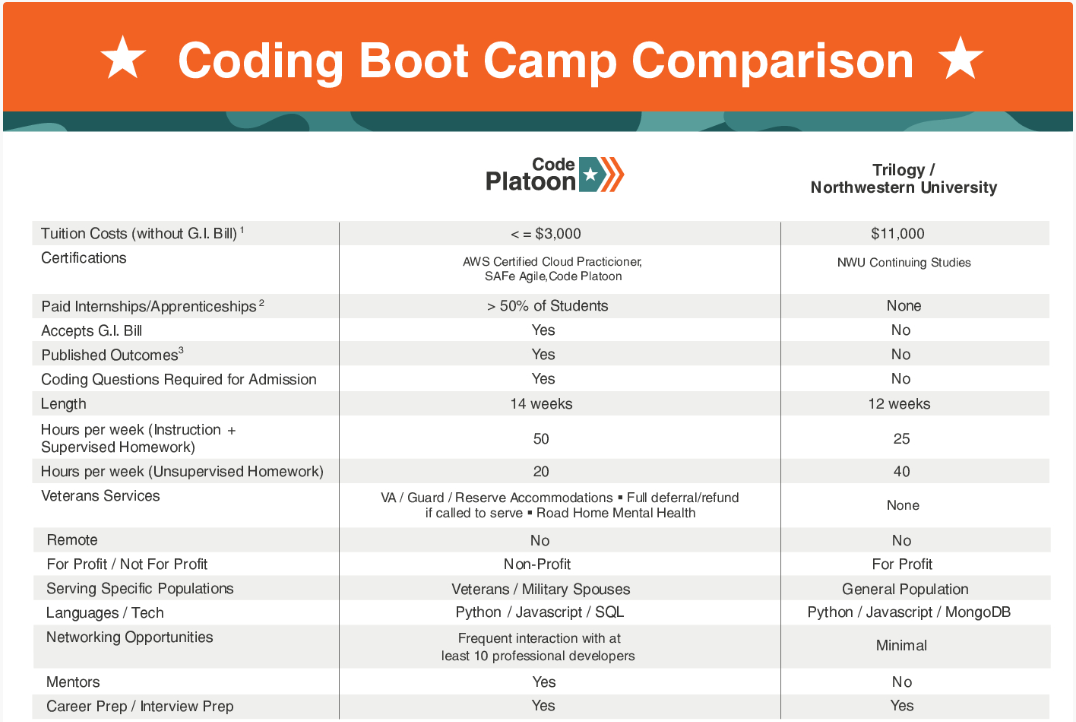Bootcamp Cost Breakdown
Understanding the financial commitment involved in a coding bootcamp is crucial for prospective students. Northwestern’s coding bootcamp, like many intensive programs, requires a significant investment, but various funding options exist to make it more accessible. This section provides a detailed breakdown of the costs and available financial assistance.
Tuition Fees
The tuition for Northwestern’s coding bootcamp varies depending on the specific program and its length. It’s advisable to check the official Northwestern website for the most up-to-date pricing. However, expect a substantial investment, potentially ranging from $10,000 to $20,000 or more, depending on the program’s duration and intensity. This cost typically covers the curriculum, access to learning resources, and career services support. Hidden costs, such as the purchase of a personal laptop that meets the program’s specifications, additional software licenses, or commuting expenses, should also be factored into the overall budget.
Financial Aid Options and Scholarships
Northwestern, along with many other bootcamps, offers various financial aid options and scholarship opportunities to make the program more affordable. These often include merit-based scholarships awarded to students demonstrating exceptional academic achievements or potential, need-based grants based on financial circumstances, and employer-sponsored tuition assistance programs. Prospective students should thoroughly explore the available options on the Northwestern website and inquire directly with the admissions office to understand their eligibility for financial aid. Examples of potential scholarships could include those sponsored by technology companies or industry associations, aimed at supporting diverse talent in the tech sector.
Payment Plans and Financing Options
To ease the financial burden, Northwestern likely offers several payment plan options. These might include splitting the tuition into monthly installments over the bootcamp’s duration or longer-term payment plans. Additionally, the institution might partner with third-party financing companies to provide students with low-interest loans or other financing options tailored to their financial needs. It is essential to carefully review the terms and conditions of any payment plan or financing option before committing to them, paying close attention to interest rates, repayment schedules, and any associated fees.
Cost Comparison with Similar Programs
The following table compares the estimated cost of Northwestern’s coding bootcamp to similar programs at other reputable universities. Note that these figures are estimates and may vary depending on the specific program and year. Always check the official websites for the most accurate and current pricing.
| Institution | Program Name | Estimated Tuition | Payment Options |
|---|---|---|---|
| Northwestern University | [Specific Bootcamp Name] | $15,000 – $20,000 (estimated) | Installments, financing options |
| University of California, Berkeley Extension | [Specific Bootcamp Name] | $12,000 – $18,000 (estimated) | Installments, financing options |
| General Assembly | [Specific Bootcamp Name] | $10,000 – $15,000 (estimated) | Installments, financing options |
| Flatiron School | [Specific Bootcamp Name] | $13,000 – $17,000 (estimated) | Installments, financing options |
Curriculum and Career Services: How Much Is Northwestern Coding Bootcamp

Northwestern’s coding bootcamp provides a comprehensive curriculum and robust career services designed to equip graduates with the skills and support needed for successful entry into the tech industry. The program’s strength lies in its blend of practical, in-demand skills training and a dedicated career support system that extends beyond graduation.
The curriculum focuses on equipping students with both foundational and advanced skills in software development. This approach ensures graduates are prepared for a range of roles within the tech landscape. The emphasis on practical application, through projects and real-world simulations, allows students to build a portfolio that demonstrates their capabilities to potential employers.
Curriculum Details
The Northwestern coding bootcamp curriculum covers a wide array of in-demand technologies and programming languages. Students gain proficiency in front-end and back-end development, learning languages such as JavaScript, Python, and SQL. They also develop skills in database management, version control (Git), and agile development methodologies. The curriculum often includes modules on specific frameworks and libraries like React, Node.js, and Express.js, reflecting the current industry trends. Specific course content can vary slightly from cohort to cohort, but the overall focus remains consistent: producing job-ready developers.
Career Services Overview
Northwestern’s coding bootcamp offers extensive career services, including personalized career coaching, resume and portfolio reviews, mock interviews, and access to a network of alumni and industry professionals. The career services team works closely with students throughout the program and beyond, providing guidance on job searching, salary negotiation, and career progression. They often organize workshops and networking events to connect students with potential employers. The bootcamp also boasts a strong alumni network, providing graduates with ongoing support and mentorship opportunities.
Comparison to Other Bootcamps
While many coding bootcamps offer career services, Northwestern’s program distinguishes itself through its integration with a prestigious university’s resources and network. This provides access to career fairs, industry connections, and mentorship opportunities that may not be readily available at smaller, independent bootcamps. The level of personalized support and the commitment to student success often surpasses that of other comparable programs. While the exact level of support varies across bootcamps, Northwestern’s reputation and resources contribute to a higher likelihood of successful placement.
Graduate Job Placement
The types of jobs secured by Northwestern coding bootcamp graduates vary depending on individual skills and career goals. However, many graduates find employment in roles such as:
- Front-End Developer
- Back-End Developer
- Full-Stack Developer
- Software Engineer
- Data Analyst
- Web Developer
- Database Administrator
The specific companies employing graduates vary, reflecting the diverse job market within the tech industry. However, many graduates secure positions at both established tech companies and startups, demonstrating the versatility of the skills they acquire.
Student Experience and Reviews

The Northwestern coding bootcamp boasts a strong reputation, built largely on the positive experiences of its graduates. Numerous student testimonials highlight the program’s strengths and areas for potential improvement, offering prospective students valuable insights into what to expect. These reviews provide a comprehensive picture of the learning environment, teaching methodologies, and overall impact on career prospects.
Teaching Quality
Instructors at the Northwestern coding bootcamp are frequently praised for their expertise and dedication to student success. Many reviews describe instructors as highly knowledgeable, approachable, and effective communicators, capable of explaining complex concepts in a clear and understandable manner. Students appreciate the instructors’ willingness to provide individual support and guidance, fostering a collaborative and supportive learning environment. A common theme in positive reviews is the instructors’ ability to adapt their teaching style to meet the diverse learning needs of the students. For example, one student commented on the instructor’s patience in explaining difficult concepts repeatedly until everyone understood.
Curriculum Effectiveness
The curriculum’s effectiveness is another area consistently highlighted in positive student reviews. Many graduates report feeling well-prepared for entry-level roles in software development after completing the program. The practical, hands-on approach to learning, emphasized through projects and real-world applications, is often cited as a key factor contributing to the program’s success. Students appreciate the balance between theoretical knowledge and practical skills development, which allows them to confidently apply their newly acquired skills in professional settings. For example, several reviews mention the significant improvement in their problem-solving skills and their increased comfort level with various programming languages and technologies.
Career Support
Northwestern’s commitment to career services is a significant draw for many prospective students. Positive reviews frequently cite the effectiveness of career counseling, resume workshops, and mock interviews in preparing graduates for the job search. Access to a robust network of alumni and industry professionals is also highly valued, providing students with valuable connections and mentorship opportunities. Many graduates report securing jobs in their desired fields shortly after completing the program, often attributing their success to the comprehensive career support provided by the bootcamp. One review described the career services team as instrumental in landing their first role, citing the personalized guidance and support they received throughout the job search process.
Learning Environment and Teaching Methodologies
The learning environment is often described as collaborative and supportive, with a strong emphasis on peer learning and teamwork. Project-based learning is a core component of the curriculum, encouraging students to work together to solve real-world problems. The instructors employ a variety of teaching methodologies, including lectures, hands-on exercises, and group projects, to cater to different learning styles. The overall atmosphere is described as energetic and engaging, with students feeling comfortable asking questions and seeking help from instructors and peers. This collaborative environment encourages knowledge sharing and strengthens the sense of community amongst students.
Summary of Student Experience
| Aspect | Positive Feedback | Areas for Improvement | Overall Impression |
|---|---|---|---|
| Teaching Quality | Knowledgeable, approachable instructors; effective communication; personalized support | Some students mentioned a preference for more individualized attention in larger classes. | Highly positive |
| Curriculum Effectiveness | Practical, hands-on approach; strong foundation in relevant skills; well-prepared for entry-level roles | Suggestions for more advanced topics in specific areas. | Very positive |
| Career Support | Effective career counseling; strong alumni network; helpful job search resources | Some students suggested more industry guest speakers. | Positive |
| Learning Environment | Collaborative; supportive; engaging; strong sense of community | No significant negative feedback reported. | Excellent |
Admission Requirements and Application Process

Gaining admission to Northwestern’s coding bootcamp involves meeting specific requirements and navigating a structured application process. The program seeks candidates with a diverse range of backgrounds and experiences, but all applicants must demonstrate a commitment to learning and a potential for success in a demanding, fast-paced environment.
The selection process emphasizes a holistic review of each applicant’s qualifications. This goes beyond simply assessing technical skills and considers factors such as problem-solving abilities, teamwork skills, and overall potential for career success in the tech industry. The program aims to create a cohort of students who will support and learn from one another.
Admission Requirements
Northwestern’s coding bootcamp typically requires a high school diploma or equivalent. While prior programming experience is beneficial, it’s not always mandatory. Many successful applicants have transitioned from unrelated fields. However, demonstrating a genuine interest in software development through personal projects, online courses, or relevant work experience significantly strengthens an application. A strong understanding of basic math and logical reasoning is also crucial.
Application Procedures
The application process generally involves completing an online application form, providing transcripts (if applicable), and submitting a resume or curriculum vitae (CV) outlining relevant experience and skills. Many programs also require a short essay or personal statement, allowing applicants to showcase their motivation and career aspirations. A technical assessment, often involving coding challenges or problem-solving tasks, may also be part of the process.
Selection Criteria
The selection committee assesses applicants based on several key factors. These include academic background, prior experience (if any) in technology, demonstrated problem-solving abilities, communication skills, and the overall fit with the program’s learning environment and cohort. Strong letters of recommendation from individuals who can attest to an applicant’s skills and work ethic can also positively influence the selection decision. The goal is to select individuals with the potential to thrive in the program and contribute positively to the learning community.
Typical Successful Applicant Profile
A successful applicant typically demonstrates a strong work ethic, a proactive learning attitude, and a genuine passion for technology. They may possess some prior programming experience, but this is not a strict requirement. What’s more important is a demonstrable aptitude for learning new concepts quickly and a willingness to collaborate effectively with peers. Many successful applicants come from diverse professional backgrounds, demonstrating that a successful career transition into software development is achievable with dedication and the right training. For example, a successful applicant might be a recent college graduate with a non-technical degree who has independently pursued online coding courses, or a professional seeking a career change who has built personal projects to showcase their developing skills.
Step-by-Step Application Guide, How much is northwestern coding bootcamp
- Create an account: Register on the Northwestern coding bootcamp’s online application portal.
- Complete the application form: Provide accurate and detailed information about your educational background, work experience, and technical skills.
- Submit required documents: Upload your transcripts (if applicable), resume or CV, and any other requested documents.
- Complete the technical assessment: Successfully complete any coding challenges or problem-solving tasks that are part of the application process. This often involves demonstrating proficiency in specific programming languages or concepts.
- Submit your essay or personal statement: Articulate your reasons for applying, your career goals, and your suitability for the program.
- Request letters of recommendation: Ask individuals who can attest to your skills and work ethic to submit letters of recommendation on your behalf.
- Submit your application: Ensure your application is submitted before the stated deadline.
- Await notification: The program will notify applicants of their admission status after the review process is complete.


Tim Redaksi